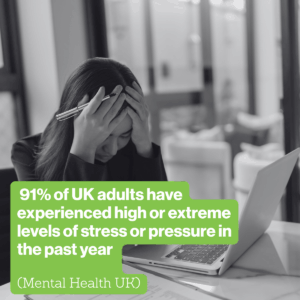In today’s fast-paced world, many of us are balancing increasing demands at work and at home. Managing stress and preventing overwhelm has become essential to maintaining both productivity and wellbeing.
Rising living costs and the shift to hybrid working have added new pressures, often blurring the boundaries between our professional and personal lives. As a result, it can be harder than ever to find time to pause and recharge.
In this blog, we’ll explore why feelings of overwhelm can arise at work — and share practical steps to help you manage them more effectively.
What are the signs of overwhelm?
We tend to only spot and express that we are overwhelmed when that situation has hit a critical level. There are, however, some early warning signs that we should heed:
The relationship between our minds and bodies is well documented so if we focus on how we feel, both physically and mentally, we may be able to press pause before stress takes hold.
What to do if you’re overwhelmed at work
-
Think about how you can manage time in meetings, calls and emails (is every meeting actually necessary).
-
If you’re working from home, ensure that there is a clear demarcation. Physically put your laptop in another room when you’ve finished work, schedule in a lunch break, walk, change of scenery.
-
Practical solutions such as disabling work emails on your phone can help, to prevent you checking them in bed, on holiday, or in your general free time.
-
The relationship between well-being and exercise is documented so another practical solution could be to switch your phone off or put it into flight mode when exercising.
-
Make a list of what is overwhelming you, prioritise what needs doing, and be realistic with the time you have to do it in.
-
Once you’ve made the list, delegate what you can. Delegation often comes from a place of confidence and it’s not always easy to do, but it is necessary if you are feeling overwhelmed.
-
Set manageable goals There is nothing worse than giving yourself a huge list of things you need to achieve in a day and then only managing to cross one or two off. Be realistic and be gentle with yourself about what is achievable and manageable in a day so that you take small steps and build that feeling of success and achievement.
-
At the beginning of each day, think about one thing to do that if you achieve it will have made the day a success. Don’t forget to recognise the small wins.
-
Learn to say no – we understand that saying no can be difficult, but if something is causing more stress than enjoyment, it’s okay to decline. Be clear and polite – explain why you can’t commit right now, or suggest an alternative time that works better for you.
-
Have conversations about realistic timescales – often we assume things need doing immediately when that’s often not the case. If your boss has asked you to do several things, ask, “When does this need doing by?” If there’s several things you’ve been given and it’s not feasible to get them done in the timescale allowed, ask for clear priorities in what needs to be done, highlighting this may mean other deadlines need to be pushed back. The majority of people are reasonable, and by opening lines of communication and understanding expectations a lot of stresses can often be alleviated.
-
Delegate.
-
Set boundaries – don’t feel obliged to reply to out of hour emails. People will soon realise that you’re not available during that time. Don’t feel you can’t protect your free-time.
-
Live in Day Tight compartments – only worry about what’s happening today – that’s all you can control. Sometimes even an entire day can feel too big and perhaps we need to segment it into half days or even hourly chunks.




